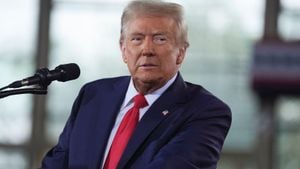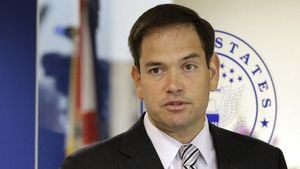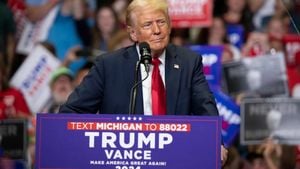Robert F. Kennedy Jr.'s involvement with Donald Trump's administration is stirring significant dialogue across the political spectrum. Recently, Trump named Kennedy as his nominee to head the Department of Health and Human Services (HHS). This nomination posits Kennedy at the intersection of public health policy and political influence, unpacking his controversial stance on vaccine safety and other health-related issues.
For those not on the front lines of American politics, the choice of Kennedy might raise eyebrows. A prominent figure known for his advocacy against vaccines, latest reports indicate Kennedy is poised to spearhead one of the government's primary health agencies and influence policies related to healthcare, pharmaceuticals, and nutrition. His appointment reflects Trump's approach to government reforms, particularly his aim to revamp agencies he primarily views as mired in bureaucracy.
On social media, Trump articulated the core reasons for Kennedy's nomination, saying, "The Safety and Health of all Americans is the most important role of any Administration, and HHS will play a big role in helping..." He also emphasized Kennedy's commitment to ensuring transparency and scientific integrity at the HHS, encapsulating Trump’s broader health agenda—"Make America Great and Healthy Again!"
Kennedy's history isn't devoid of scrutiny; he has been linked to multiple conspiracy theories, particularly surrounding vaccines, which he claims endanger public health. Critics argue his ideas, which have gained traction over the years, could undermine established health protocols. Though he contends he isn’t anti-vaccine, his skepticism and public comments, such as alleging the connection of autism to vaccinations, have perpetually placed him under the lens of public health experts.
His nomination has even caused ripples among vaccine manufacturers, as stock prices for key players like Pfizer and Moderna dipped following the announcement, showcasing just how polarizing his stance has become within the healthcare sector.
Throughout the transition, RFK Jr. has positioned himself as pivotal in shaping the future direction of Trump’s policies. He initiated a platform dubbed 'Policies for the People', aiming to collaboratively involve the public in policy-making. This initiative invites Americans to suggest policies and potential candidates for various governmental roles, creating a more grassroots level of involvement than seen during past administrations. The platform has already registered tens of thousands of suggestions, evidencing considerable public engagement with the prospective administration.
Advocates of the initiative argue it create transparency and serves as pushback against typical lobbyist influence. "We need to act fast...600 people are going to walk out of NIH on January 21," Kennedy stated, referencing aspirations to reshape the institution fundamentally.
Among the ideas being floated, some supporters are highlighting the potential to reshape health communications and community health initiatives, with Kennedy pledging to eliminate perceived conflicts of interest. He has also indicated intentions to revitalize procedures around regulatory oversight, especially concerning pharmaceuticals and public health warnings.
The groundwork for this change has begun, with Kennedy and his allies focusing on how American diet and health regulations are crippling the nation's public health system. Notably, he has echoed sentiments about the regulatory influence large corporations wield over federal agencies, particularly highlighting programs he deems problematic, like the FDA’s backing of certain food additives.
The ambitious objective laid out by Kennedy’s supporters is to combat what they describe as the "industrial food complex" and eliminate harmful substances from the American diet, which they believe have contributed drastically to chronic diseases. During speeches catering to his new role within Trump’s transition, Kennedy emphasized addressing American health crises through elimination of toxic materials currently permeable within the food supply.
Critics of Kennedy’s views maintain skepticism about the practical implementation of such reforms, pointing to the overwhelming reliance of public health policy on scientific consensus around vaccination and dietary guidelines. They warn of potential public health risks arising from policies driven more by personal beliefs than empirical evidence.
Yet, Kennedy's nomination could also reflect Trump's strategy to consolidate his grassroots support base, aligning his administration's health policies with the anti-establishment sentiments prevalent among certain voter groups. This approach has characterized Trump's political identity, and placing RFK Jr. within a prominent role could bolster his outreach to health-conscious voters disenchanted by traditional political maneuvering.
Trump's early decisions on cabinet roles signal not only return to the political scene but also the establishment of a distinct governance style, emphasizing personal loyalty and ideological alignment over conventional experience within political appointments. Alongside reliable allies like Stephen Miller and Rep. Elise Stefanik, Trump appears set to address contentious issues from immigration to healthcare through his thematic lens.
Meanwhile, Kennedy’s dual endorsement of Trump just months prior is noteworthy. His exit from the presidential race, previously backed by some Democrats, catapults him firmly as part of Trump's base, with the possibility of transforming both his and Trump’s narratives surrounding health regulations moving forward.
With the Trump administration’s official starting date approaching, the political wind seems consistently shifting toward policies rooted more deeply within populist ideologies than traditional bipartisan affairs. The resultant transformation of American health policy under Kennedy could broadly redefine how the government engages with its citizens concerning public health—a prospect both thrilling and alarming to many observers.
This development prompts questions about the legislative changes RFK Jr. aspires to introduce and how these shifts will align with the underlying scientific guidelines established through decades of health research. While excitement envelops some key supporters, trepidation surrounds those wary of the potential lapses or deviations from established medical to more individualized health paradigms. The larger ramifications of Kennedy’s vision necessitate careful observation as they evolve through the infrastructure of Trump's re-imagined government.
This cohesive blend of personal charisma, controversial policies, and populism makes Kennedy's role as HHS Secretary of acute interest. The choices he faces are not merely reflective of health trends but will echo throughout the political stratums as well, shaping how health policy intersects with American values, democracy, and health equity.



